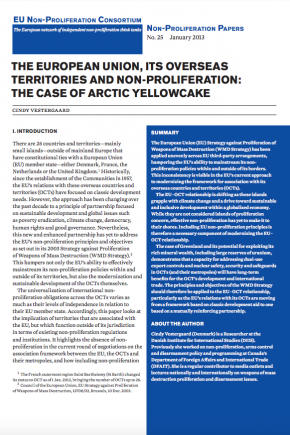The European Union, its Overseas Territories and Non-proliferation: The Case of Arctic Yellowcake
The European Union (EU) Strategy against Proliferation of Weapons of Mass Destruction (WMD Strategy) has been applied unevenly across EU third-party arrangements, hampering the EU’s ability to mainstream its nonproliferation policies within and outside of its borders. This inconsistency is visible in the EU’s current approach to modernizing the framework for association with its overseas countries and territories (OCTs). The EU–OCT relationship is shifting as these islands grapple with climate change and a drive toward sustainable and inclusive development within a globalized economy. While they are not considered islands of proliferation concern, effective non-proliferation has yet to make it to their shores. Including EU non-proliferation principles is therefore a necessary component of modernizing the EU– OCT relationship. The case of Greenland and its potential for exploiting its rich mineral wealth, including large reserves of uranium, demonstrates that a capacity for addressing dual-use export controls and nuclear safety, security and safeguards in OCTs (and their metropoles) will have long-term benefits for the OCT’s development and international trade. The principles and objectives of the WMD Strategy should therefore be applied to the EU–OCT relationship, particularly as the EU’s relations with its OCTs are moving from a framework based on classic development aid to one based on a mutually reinforcing partnership.

